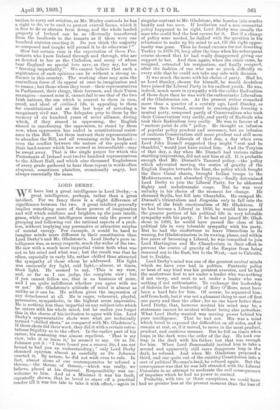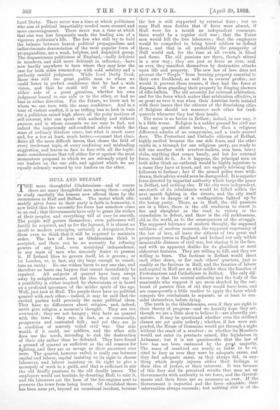LORD DERBY.
WE have lost a great intelligence in Lord Derby,—a great intelligence, perhaps, rather than a great intellect. For we fancy there is a slight difference of significance between the two. A great intellect generally implies something more of those powers of imagination and will which reinforce and brighten up the pure intelli- gence, while a great intelligence means only the power of grasping and following out the rational aspects of a prob- lem, without implying any persuasive or attractive surplus of mental energy. For example, it would be hard to imagine minds more different in their constitution than Lord Derby's and Mr. Gladstone's. Lord Derby's pure in- telligence was, in many respects, much the wider of the two. He saw with a much more impartial vision both what was not to his mind and what was ; but the result was that he often, especially in early life, rather chilled than attracted the sympathy of those whom he addressed. His light was eminently dry light, cold light,—almost, at times, bleak light. He seemed to say, This is my view, and, so far as I can judge, the complete view ; but if you cannot follow me, that is no business of mine, and I am quite indifferent whether you agree with me or not.' Mr. Gladstone's attitude of mind is almost as unlike as it can be. He seldom gives the impression of any detachment at all. He is eager, vehement, playful, persuasive, sympathetic, in the highest sense impressive. He is nothing less than impartial on any subject into which he enters with his whole mind, but he makes you forget this in the charm of his invitation to agree with him. Lord Derby's argumentative shots were what are technically termed " chilled shots," as compared with Mr. Gladstone's. If those shots did their work, they did it with a certain osten- tatious frigidity as to the effect. In the earlier part of his career, his reasoning was almost repellent. ' That is my view, take it or leave it,' he seemed to say. Or as Dr. Johnson put it : " I have found you a reason, Sir, I am not bound to find you an understanding ; " only Lord Derby shunned epigram almost as carefully as Dr. Johnson courted. it. By nature, he did not wish even to rule. In fact, almost alone of our contemporaries he refused a throne,—the throne of Greece,—which was really, we believe, placed at his disposal.. Responsibility was un- welcome to him. And as a Minister it was his fault, repeatedly shown, that he loved to stave off a practical resolve till it was too late to take it with effect,--again in singular contrast to Mr. Gladstone, who hurries into resolve hastily and too soon. If hesitation and a, non-committal policy happened to be right, Lord Derby was usually the man who could find the best excuse for it. But if a change of policy were needed, he dallied with the question in his reluctance to make up his mind to act, till the right oppor- tunity was gone. Thus he found excuses for not deserting Turkey in 1876-78, long after the time when his subsequent course showed that he had really disapproved giving our support to her. And then again, when the crisis came, he resigned, retracted his resignation, and finally resigned, after the fashion of one who saw so much difficulty on every side that he could not take any side with decision. It was much the same with his choice of party. Had he, as Lord Stanley, chosen for himself, he would doubtless have joined the Liberal Party in his earliest youth. He was, indeed, much more in sympathy with the colder Radicalism of those days than he was with the enthusiastic Liberalism of the Gladstonian era. As the present writer remarked more than a quarter of a century ago, Lord Stanley, as he was then termed, seemed to contemplate forming a neutral party, composed partly of Conservatives who took their Conservatism very coolly, and partly of Radicals who took their Radicalism very coolly. He was in favour of a " surtout point de zee " policy. He thought an infusion of popular policy prudent and necessary, but an infusion of cautious Conservatism still more prudent and still more necessary. The Liberals of that day, a day when even Lord John Russell suggested they might "rest and be thankful," would just have suited him. And the Toryism of that day, a, day when Mr. Disraeli had various rather startling inspirations, did not suit him at all. It is probable enough that Mr. Disraeli's Tancred policy,—the policy which advocated moving the centre of gravity of the English Empire towards the East, the policy which bought the Suez Canal shares, brought Indian troops to the Mediterranean, and absorbed Cyprus,—finally determined Lord Derby tojoin the Liberal Party, for he abhorred flighty and melodramatic coups. But he was very unlucky in his choice of the moment for change. He shunned Scylla, but fell into Charybdis. He escaped Mr. Disraeli's Orientalism and Jingoism only to fall into the vortex of the Irish emotionalism of Mr. Gladstone. If he had become a Liberal in 1850, he would have passed the greater portion of his political life in very tolerable sympathy with his party. If he had not joined Mr. Glad- stone in 1880, he would have passed the close of his political life in very tolerable sympathy with his party. But he bad the misfortune to leave Disraelism in its waning, for Gladstonianism in its waxing, phase, and within five years of becoming a Liberal, he was compelled to join Lord Hartington and Mr. Chamberlain in their effort to prevent the centre of gravity of the Empire from being removed not to the East, but to the West,—not to Calcutta, but to Dublin.
Lord Derby's mind was one of the greatest neutral minds which we have ever had in politics. Fantastic policy or heat of any kind was his greatest aversion, and he had the misfortune first to act under a leader who was nothing if not viewy, and next to act under a leader who was nothing if not enthusiastic. To exchange the leadership of Sidonia for the leadership of Rory O'More, must have been a hard fate for him. Of course, he separated him- self from both, but it was not a pleasant thing to cast off first one party and then the other ; for no one knew better than Lord Derby, that, however neutral his mind may be, a statesman cannot be neutral without being also powerless. What Lord Derby wanted was moving power behind his pure intelligence. That he had not. His was a mind which loved to expound the difficulties on all sides, and to remain at rest, or, if it moved, to move in the most gradual, prudent, and cautious manner. But he fell on times when leaps in the dark were the order of the day. He took one leap in the dark with his father, but that was enough for him. When Lord Beaconsfield invited him to take a second and apparently still more dangerous leap in the dark, he refused. And when Mr. Gladstone proposed a third, and one quite out of the existing Constitution into a sort of political No-man's-land, he refused again. But the consequence was that he was left stranded with the Liberal Unionists in an attempt to moderate the evil consequences of impulses which he had no power to control. Probably, with two or three exceptions, we could have had no greater loss at the present moment than the loss of Lord Derby. There never was a time at which politicians who aim at political impartiality needed more counsel and more encouragement. There never was a time at which that aim was less frequently made the leading aim of a vigorous politician's life. The few who still try to hold the balance between heated political propagandism and indiscriminate denunciation of the most popular form of propagandism, are a weak, helpless, and dispirited group. The dispassionate politicians of England,—sadly deficient in numbers, and still more deficient in influence,—have now hardly anywhere to turn where they may hear the case for both sides summed-up with cold sobriety and a perfectly candid judgment. While Lord Derby lived, there was still one great public man to whom we could listen in perfect confidence that he had a wide vision, and that he could tell us all he saw on either side of a great jiauestion, whether his own judgment leaned to one side or to the other, or had no bias in either direction. For the future, we know not to whom we can turn with the same confidence. And in a time of violent conflict, it is no trifling loss to look in vain for a politician raised high above all the petty motives of ,self-interest, who can speak with authority and without passion, and in whose counsels we are sure to find, not indeed the imperiously self-confident advice which the mass of ordinary thinkers crave, but what is much rarer and, for a few at least, much better,—counsel that eluci- dates all the more difficult issues, that clears the field of every irrelevant topic, of every confusing and misleading suggestion, and leaves us face to face with all the legiti- mate considerations that tell either for or against the most momentous proposal to which we are solemnly urged by our leaders on the one side, and against which we are equally solemnly warned by our leaders on the other.



















































 Previous page
Previous page